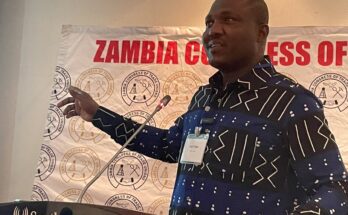In this chat with ENE OSANG, Zainab Ali, popularly called Mama Gwoza, the only female member of the Civilian Joint Task Force (CJTF) operating in Gwoza local government area (LGA) of Borno state, reveals why she is volunteering as a security personnel. According to her, she has prevented many females from being raped at the Bakassi camp.
Encountering terrorists
Zainab Ali enjoyed the peaceful humble living in Borno state as a trader and never dreamt of being a security personality until Boko Haram insurgents attacked her village and her life changed, bringing upon her the responsibility of taking male and female roles.
Zainab joined the CJTF to ensure security at the camp and also to protect other female IDPs from rape: A common trend at the camp allegedly practised by military officers; hence she got the title Mama Gwoza which has become a household name when security issues, especially in the North-east of Borno state, are discussed.
She presently mans the security post at the Bakassi camp of Internally Displaced Persons (IDPs) located at Damboa Biu road in Maiduguri, the Borno state capital.
Like a heroine she turned her horrible experience of encountering terrorists to a golden opportunity, bringing herself to the limelight as she keeps striving to survive against all odds.
Sharing her story with this reporter, Mama Gwoza recalled the very night her village was attacked, describing the experience as “the most horrible day” of her life.
“I have seen, heard and experienced the attack by Boko Haram and I pray we never witness something of its kind again. Our village was attacked and we had to run with our children at night for several hours in fear of being killed. We spent about six to seven days on the road. There was no time to stop except when children cried and we had to stop to give them water or vegetable to eat.
“The water we drank was the stagnant water from the rainfall which was yet to be dried. We just bend and drink from the ground. When we hear gun shots, we continue to run.”
Most memorable experience
Mama Gwoza said she can never forget the experience of walking non-stop in the dark for days before being rescued.
“My feet still hurt so I cannot forget because of all distances we covered. I am sure you noticed I limp when I walk; it is because I sprained my ankle when we were running from Gwoza to Madagali. It was at night because during the day, we lay low in the grasses and continue the journey in the evenings.
“On one of those evenings, I hit my leg on a rock. I feel the pain when I go to bed sometimes and it pains me to the point that I cry, but I thank God that I am alive.”
The God factor
According to her, God’s mercies kept them alive and ordered their steps to the right direction enabling them escaped being killed before they where finally rescued at Madagali village.
“We hid in the grass while running for safety, even when we saw snakes running we couldn’t move from the spot. It was God that kept us safe because we trekked from Gwoza to Madagali. It was from Madagali that members of the State House of Assembly and House of Representatives sent over vehicles to take us to Askira Uba, afterwads we were moved to the Government College IDPs camp and from there to Bakassi camp.
‘I have been in this camp for the past four to five years now and I have seen and experienced so many things. I used to worry before now but receiving people like you over time makes me forget some of the challenges I went through.”
Thoughts on insurgency
Though the attack on villages has led to the loss of many lives and properties, the female CJTF member who has been badly affected still makes case for the dreaded sect, saying while some of them were forced to join, others joined out of frustration.
“I think it is not the fault of some of those that perpetrated this tragedy; I cannot say for sure that some of them carried out the attacks out of volition. I think some of them were forced to do what they did and still doing. I never imagined something like this would happen and I never thought that it will still be on for 11 years but we hope that it will stop soon.
“Some of them might have joined out of frustration or depression. I just believe this has been destined to happen because nothing happens without God’s consent.”
Being female CJTF
Mama Gwoza said a lot has happened since the attack and most women have lost their sources of livelihood, but for her, she is happy being a female CJTF saying this has made her popular.
According to her, the job is tasking, but not rewarding because she only volunteered. However, she expressed the hope for a better live, saying one must not give up even in the worst situation.
“We check those who may come with the intention to attack us whether with guns or bombs. We also follow up complaints of suspicious persons.”
On whether she has caught any insurgent in the course of her work, she said, “Yes, I have and we handed them over to the military. We caught a Boko Haram member with a gun while he was trying to make his way into the camp.
“This work (CJTF) is voluntary and I don’t get paid. Sometimes, we work late into the night but passion to see things go right in this camp made me volunteer to be a member. We only get money when people who come into the camp like you give us handouts. It is from there that we get to buy things or foodstuff.
“But I believe this has been destined by God, so I don’t take all my experiences too much to heart to avoid it affecting my blood pressure. I gave birth to 12 children; my eldest child is 21-years-old and the youngest one is 11. I have nine of them with me in camp because two were killed and I don’t know if the last one is dead or missing. So, I can say I have ten children.
“Also, I have no father and mother again and the father of my children is late too. The last time I met my husband’s relatives was seven days after the mourning period. As for my relatives, we are all struggling with these challenges and that tells you the story of how a dependent person is also depended on.”
Rape in camp
Over time, many reports have disclosed cases of rape in the camp, with all fingers pointing to military officers who allegedly pick girls from the camp to satisfy their sexual needs.
Mama Gwoza who could not sit and watch while this continue to happen decided to volunteer as a task force member so as to tackle “ugly trends like this.”
“Yes, military officers were picking our girls here in the camp and taking advantage of them sexually: It did happen, but now there is reduction in such issues as we have put eyes on the ground to monitor.
When I am at the gate, I don’t allow these girls go out with any officer outside the gate, or in corners within the camp, except what I did not see.
“It has happened before and a grown woman like me had a baby and dropped him in the toilet. Human rights came in, it generated a lot of issues and they later realized she had mental disorder or depression.
“Aside this case, I have not seen any other female being raped since manning the gate except if it was hidden. Also, people like you journalists come to sensitise us and give us phone numbers we can report to if such cases happen. You have to be sure and verify what you have heard or what has been reported to you.”
Surviving as an IDP
Apart from volunteering as a CJTF, Mama Gwoza does other petty businesses to cater to her needs and those of her children.
“Sometimes I do small businesses to turn N5 to N10. Right now, I cannot afford to pay my children school fees. I had to withdraw them from the school outside the camp because of the school fees. There are so many children in a class here at the camp sometimes a class has about 100 to 150 which makes learning difficult.
“My children are complaining, they are not studying and the teachers also complain that the children are too many for them to handle. I have begged my children to bear with me pending when I gather enough money to enroll them in the school behind the camp.”
Expectations
Mama Gwoza is hopeful on God for a better life, saying her only wish now is to see her children through school.
“We were paying N6, 500 per term in the school they were withdrawn from, but the school in the camp collects N300 per term. I am trying to see how my older children can further their education to the university.
“One my daughters has bought a JAMB form. We are waiting for her name to come out successful while the little ones would have to wait and manage with what I can afford at the moment. I don’t have any serious business now that brings me money, but my daughter fries fish for sale. I encouraged her to start the business in order for her to help herself. She is grown up; she needs to be able to take care of herself.
“The present situation we are in is beyond me. I have tried to see that my older children get a job even if it is sweeping the street but the job seems not to be available.”
On whether the government had visited the camp after accommodating them there, she said, “I have never met him but they do come around. They see me at the gate when they do come, sometimes I expect I will receive message from them but I have not seen anyone.
“Before this conflict occurred, I had about N200, 000; I went to Kano and Lagos to buy goods. I could remember very well the day after I came back from one of those trips from Kano where I went to buy goods around 4:00pm. I just returned from Kano when our town was attacked.
“I didn’t escape with anything; there was nothing I could sell to turnover. Even if it is a loan of N100, 000 to start over my business, I know what to sell to turnover money in one or two months I can return the money.”
NGO to the rescue?
Mama Gwoza is one of the many women and men suffering from the aftermath of Boko Haram attacks.
Notable NGOs like the Paged Initiative through its project, Reporting Gender for Inclusive Development (RGID), bring “these issues to the limelight through video documentaries,” particularly the one titled Uprooted.
According to the Initiative’s managing director, Ummi Bukar, the film shows victims of Boko Haram insurgency relating their stories of survival and is used as an advocacy tool for giving a voice to the underrepresented people, especially in conflict environment.
Meanwhile, other NGOs like the West Africa Network for Peace-building (WANEP) Nigeria, in collaboration with Global Network for Women Peace-builders (GNWP) harps on inclusive women participation in peace processes, saying that their roles in this regard cannot be over-emphasised.



